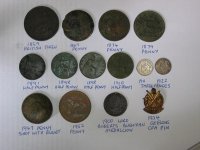hollowpointred
Gold Member
- Mar 12, 2005
- 6,871
- 56
- Detector(s) used
- Minelab Explorer SE/Garrett GTI 2500/ Ace 250
everyone always says to soak copper coins in olive oil. i understand that this process is supposed to take months if not years to work? my question is, has anyone actually soaked a coin that long and if so did it work? if anyone has any before and after pics i would love to see them. in my limited expieriance, i havent noticed any differance by doing this,other than making the coin oily.





 Monty
Monty